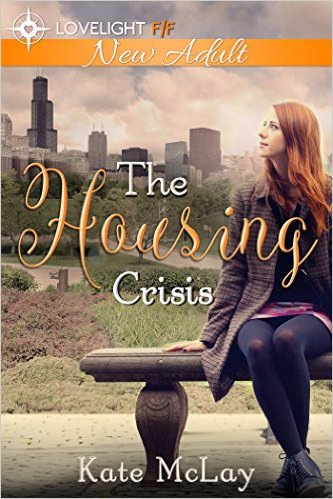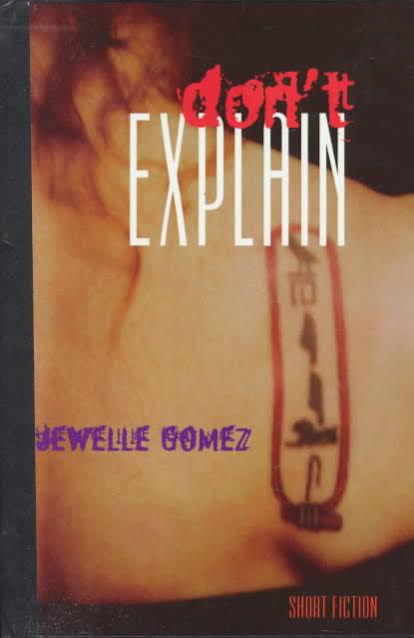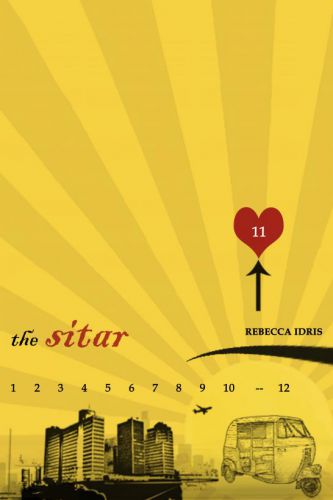Some literary journeys reveal their destination long before their narrative engine has found its hum, while others keep the reader wide-eyed and white-knuckled with a plotline that mirrors construction season on Chicago’s I-90, with lane shifts, detours and bright orange “No Shoulder” signs aplenty. Then, albeit far and few between, there are those that encourage the reader to settle into cruise, confident that she has it all figured out, right from the start… until she reaches that scene which stops her dead in her tracks. Maybe even while driving in a center lane of the Kennedy Expressway. Or in the midst of The Housing Crisis by Kate McLay on the Windy City’s quaint yet bustling near north side.
Hannah should have known better than to move in with a straight girl, but Morgan seemed different somehow. The two of them just clicked. So, nothing could have prepared her, when she arrives home early from work on the eve of their six-month anniversary, to find her girlfriend in bed beneath a shaggy blonde-haired college guy, who just so happens to still be inside her. After emptying the contents of her stomach into the toilet and cleaning herself up, Hannah meets the swollen-lipped Morgan, where she’s standing in the kitchen, and articulates the four simple words that seal their fate: “I can’t do this.”
Alyssa had everything in Nancy she could have asked in a roommate. She was easy to get along with, paid her half of the rent and covered her share of the bills. Even Nancy’s reluctance to vacuum was a non-issue in the whole scheme of things. Their arrangement worked well – or so she thought – prior to her return from work one day to find the apartment half-empty and a note from Nancy scrawled onto the back of a piece of junk mail, informing Alyssa that she had decided to move in with her boyfriend. After all, he had the truck only for the day.
With no idea as to how to come up with the rent, due in a couple weeks’ time, Alyssa promptly places an ad and begins asking around work. Among the prospective roommates she’s interviewed, not a one has come close to fitting the bill. Then, out of the blue, she receives a voicemail from a woman named Hannah, explaining that Nancy mentioned she might be looking for a roommate and that she, herself, is looking for a room.
The attraction between the two women is palpable even as Hannah arrives on Alyssa’s doorstep with her entire life packed into two bags and a guitar case, which isn’t much of a problem for a musician who embraces her sexuality – that is, provided she doesn’t act on her desires. After all, Hannah knows well how courting a straight girl will likely turn out. Yet, for Alyssa, who was raised Catholic and brought up with intensely conventional Midwestern mores and a God-fearing approach to life, the suddenly sensual nature of her dreams, all of them about Hannah, inspires a fair amount of anxiety and a mighty dose of confusion, especially when she awakens with her hand tucked into her moist panties.
If truth be told, I spent a good portion of my time reading The Housing Crisis with my hands splayed (not in my pants, but) through my hair, grasping any graying strands long enough not to slip through my fingers. Initially, the story progresses with a painful predictability as McLay offers up the most crucial conflicts and resulting emotional fallout in a manner which steals every ounce of her own thunder, spelling out dynamics that would have been better shown and summarizing her characters’ internal responses without the slightest hint of restraint. With each successive chapter, I felt increasingly robbed of the exhilarating tension that resides in the gradual unfolding of a well-crafted tale.
Very little of the narrative is written in-scene, and the meager snippets of stilted dialogue prove as contrived as they do improbable. The unsupported shifts in point-of-view muddy any sense of groundedness within the storyline and cast suspicion upon all that one should be able to take for granted from an omniscient third-person narrative. Don’t get me wrong, I’m all for unreliable narrators, but the incessant head-hopping proves disorienting.
McLay successfully, if not compellingly, conveys Alyssa’s sheltered upbringing and resulting moral code; however, the reader is never given the opportunity to fully experience Alyssa’s evolution when, rather than showing her reactions to a major development, the narration simply states, “And then they were kissing again and things made a lot more sense.”
Ironically enough, Alyssa’s burgeoning self-awareness and empowerment are the novella’s raison d’etre; yet, in the midst of losing her virginity, the narration again informs, “Alyssa felt free, freer than she’d ever felt in her entire life.” and “This was living.” How much more profound would it be to observe such a sentiment directly in the moment and witness its gravity within a catch in her breath or the slow roll of a single salty tear?
In spite of occasionally jarring and inconsistent word choices, random shifts in point-of-view, vague descriptions and glaring grammar and punctuation errors among a plethora of other issues, I desperately wanted McLay to succeed, for her potential is so very evident; and, after dropping a mighty bombshell toward the conclusion, in concept, she does. Though the inclusion of the completely unexpected doesn’t necessarily redeem the weaker aspects of the piece, it certainly pleads the case for a thorough revamping of the manuscript. If only McLay would take Alyssa’s story and bring it to life, utilizing the tried-and-true methods of her craft, she’d have a truly noteworthy manuscript… and the satisfaction of knowing that she created a work of fiction that is not only entertaining but exceedingly influential. As I see it, if executed well, The Housing Crisis could easily be regarded as a groundbreaking contribution to the ever-expanding canon of contemporary LGBT literature. In the meantime, I’ll just keep my fingers crossed, hoping that what was released was merely, in the words of Anne Lamott, a shitty first draft.




